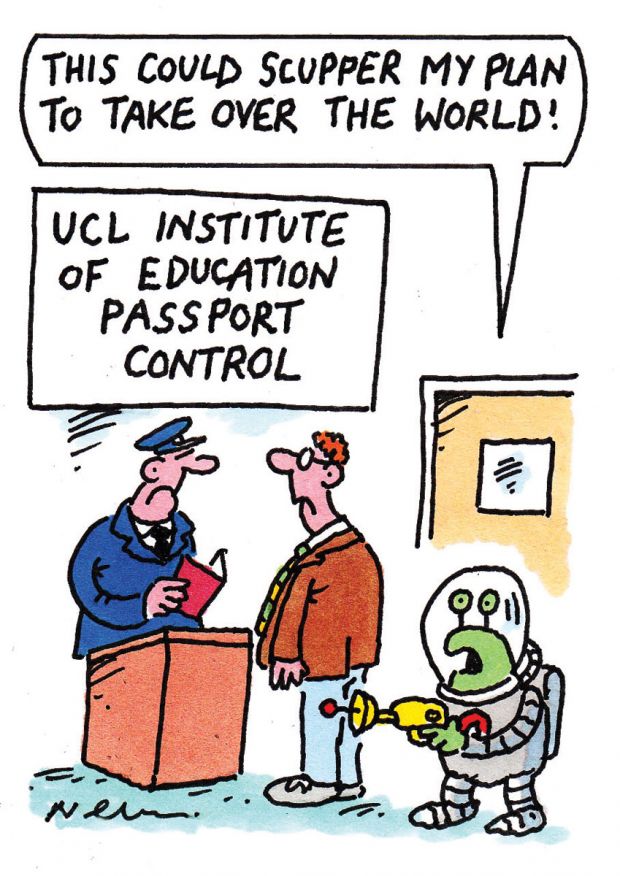
- For all the public assurances that the merger between University College London and the Institute of Education, University of London was a coming-together of equals, some IoE resistance fighters have always seen it as a takeover. That sense was only added to by an email sent to institute staff on November by Steve Denton, the IoE’s pro director for strategy and organisation. Mr Denton explained that, following the completion of the merger on 2 December, all staff should bring in their passports or work permits so that UCL could comply with its obligation “to check the right to work of every IoE employee”. According to one IoE insider, this did not go down well, with one academic likening it to the takeover of Königsberg by the Soviet Union at the end of the Second World War. As one entry to Times Higher Education’s exam howlers competition in 2012 pointed out, Stalin’s motivation for such expansionist manoeuvrings was to establish a buffet zone in Eastern Europe – but it sounds as if, in this case, the commissars forgot to bring the sausage rolls.
- If the prospect of being tutored by academic superstars such as Niall Ferguson and Steven Pinker doesn’t make you want to commit £18,000 a year to studying at the New College of the Humanities, would a spoof online video make you reconsider? The college believes that if you were a sixth-former, it just might. The Times reported on November that A. C. Grayling’s aspiring rival to Oxbridge has enlisted comedy video bloggers to play the parts of professors competing to deliver the best lecture in a spoof reality television programme. Whether the marketing strategy contributes to the tenfold increase in student enrolments the college apparently has its sights set on remains to be seen, but that goal was certainly unlikely to be furthered by Professor Grayling’s own attempt to get down with the kids at an event in 2012, where he likened the college’s superior student experience to “pimping” students’ “ride”.
- It may have taken almost 100 years, but finally Universities UK has managed to elect a female president. Dame Julia Goodfellow, the University of Kent’s vice-chancellor, will succeed Sir Christopher Snowden, the University of Surrey’s vice-chancellor, on 1 August 2015 and will hold the post until July 2017. No female president has led the organisation since it was founded as the Committee of Vice-Chancellors and Principals of the Universities of the United Kingdom in 1918. But then it has probably only been relatively recently that members have actually had more than 10 female vice-chancellors in their ranks.
- In October, Liam Byrne, the shadow universities minister, warned that vice-chancellors who attacked any Labour £6,000 fees policy would be on the “wrong side of public opinion” and invite criticism of their high salaries. That threat has now been put to the test by his own namesake. Edward Byrne, the principal of King’s College London, told The Times on November that lowering fees to such a level without replacing the lost funding would “destroy the system”. Professor Byrne, who joined King’s College from Australia’s Monash University in September, said that there was a danger of accepting “chronic underfunding” by taking money out without a plan B, and questioned the evidence that £6,000 fees would widen participation. Of course, Labour has yet to decide if such a policy will be in its manifesto, but Professor Byrne is now likely to be top of the party’s salary shame hit list, just after Myleene Klass.
- James Watson, the controversial co-discoverer of the structure of DNA, is to once again break new ground: he will become the first living Nobel laureate to auction his medal. The Financial Times reported on 28 November that the octogenarian biologist hoped the publicity around the sale would help him to re-enter public life after being shunned over his suggestion that black people were less intelligent than other races. He also hoped that the money raised by the 1962 medal – which could exceed £2 million – will allow him to buy a painting by David Hockney: presumably something from the artist’s swimming pool oeuvre, featuring a big splash.
Register to continue
Why register?
- Registration is free and only takes a moment
- Once registered, you can read 3 articles a month
- Sign up for our newsletter
Subscribe
Or subscribe for unlimited access to:
- Unlimited access to news, views, insights & reviews
- Digital editions
- Digital access to THE’s university and college rankings analysis
Already registered or a current subscriber? Login
